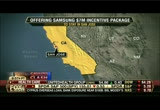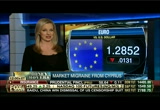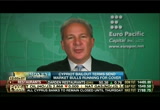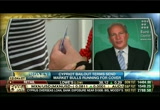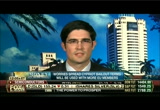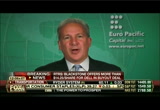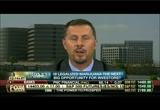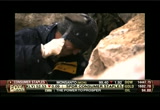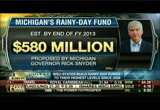tv MONEY With Melissa Francis FOX Business March 26, 2013 12:00am-1:00am EDT
12:00 am
investing in the future. anybody there now it is called a bailout for ioc smart people keeping their companies there or take them there they waited to long to remedy this situation. neil: you could think they could we getting into this $1 short and a day late but they are getting in and fighting. because rick perry is probably using the same incentive now he has other attractive assets as well but so does california, a geography, so i guess is ttis strategy even if you don't have the money it might work if they turn things around? >> it miht. but this is a huge deal of
12:01 am
it because you will see cities in california put pressure on the state because i am a liberal. neil: wait a minute. what you mean? >> i will say it. there are regulations in california that don't make sense for retentioand attraction of new business. this will put pressure to think it differently but i don't think they should follow the road to texas because we haven't talked about is put a sign they achieve the business friendly climate their education is not the answer either but certainly they could be little more friendly the and they are. >> it is too little too late. neil: it is the trend. rick perry is on the winning trend with low taxes, less regulation, they seem to have the edge >> but who do you pack?
12:02 am
but if you look at michigan with the automakers that did not work so well now even other cities are trying to sue gm for leaving. that is not a fun project if that company promises the jobs doesn't deliver. neil: a good point*. we will see what happens but the money is on the table. happy passover to our jewish friends, and "money" with our melissa francis is next. >> investors bet that all is not well in europe, cypress scored the ailout, but the bulls slammed. speculation grew that the brutal terms of the deal may become common place in future bailouts. investors bet on a weaker uro currency cleaned up. the euro at a four month low against the u.s. dollar after coming back from session lows. also, making money, owners of dell stock. actist investor carl ican
12:03 am
placed a rival bid for the company and could top the original $24 billion proposal to take bell private. michaedell reportedly tlking to blackstone about the offer in thnear future. dell closed up 2.5% today following that news, and the pta's sergio garcia proves he's money on the golf course hitting the ball into a tree during the arnold palmer invitational. he climbed into the tree to play the shot and made maye thee most insane golf shot ever seen. >> how can that be? [cheers and applause] how about that? sandra: that was real, folks, doing what it takes to make the green. even when they say it's not, it is always about "oney."
12:04 am
♪ all right, well -- jumping the gun. our top story tonight, the cypress bailout s the go ahead, but the market response is anything but joous. markets lost for the running, but not the case. despite expectations for a rally, the bulls took it on the chin today with expectations climbing the ainful bailout terms could come to more european countries. will it mark thebeginning of the end for bull market or just a blip on the radar? let's begin with peter, the ceo of euro pacific capital and spencer, the chief investment officer at seal vine investments. thank you for joinings tonight, guys. >> sure, thanks for having us on. sandra: spencer, you first. should we be scared about the termof the bailout agreement? it appears the market is. >> should be.
12:05 am
it sets up an awful precedent. imagine if this happened in the states of a little small bank, a small, don't worry about it, if a small bank went under and the fdic said let them burn, who cares, that would set an unbelievable panic here in the states, and that's what's going on in the e.u.. cypress is small and doesn't affect anything on its own, but could spread quickly to spain or italy. you are crazy to leave money in spain or italy right now. san dray: peter, you don't like bailouts, but what about this one? >> i don't, but as long as you make the mistake of bailing out a bank, the way they did this is better where all depsitors are made whole. the moral hazard around deposit insurance and perception that even the uninsured are protected. i think depositors have to be aware of the risks. remember, the banks were paying
12:06 am
high interest rates on their deposits, much higher than pretts that prevailed in germany, and they knowingly took the risk to get reward. there needs to be some losses if the banks fail. sandra: do you think, peter, there's a run on the banks after all this? >> well, i don't think you're going to see a run, but i think some people walk to the ban to grab theironey. if you have money on deposits, certainly, in any of the cries where there's problems, why leave the money in the bank? especially in today's environment where interest rates, in general, are so low, why take a chance? you know, it's not just on that side of the atlantic. you know, we got 0% interest rates in america. why leave money on deposit in a bank to get 0% when there's inflation, and, you know, nose are the two largest banks in cypress that failed. our two largest banks, bank of america and citi bank have over $2 trilion in total deposits. the fdic hasnear $25 billion in
12:07 am
treasuries. if our largest banks were to fail, we don't have anywhere near reserves to come close to the insurance deposits let alone all deposits. sandra: let's get jordan in here, an analyst in our power panel tonight. jordan, i guess this here is going to be used -- this bailout will be used as a template for future bailouts, and that investors say, well, my money's not safe, i'm going to take it and go somewhere else. do you believe that to be the case? >> right. no, not currently just because when i look at the glal markets, if you review the major european nations like germany or france, you don't see the dee tier ration that there's -- deterioration of a selloff. the spanish markets have consistencies with strengths. what you want to see if there's fear in the market, you see selling to make it a remarkable situion to worry about there being people cominginto sell, but right know, we are not
12:08 am
seeing the dterioration that suggests there's a broad market selloff coming. sandra: spencer, we had a selloff today with the market turning on a dime on the news. everybody thought markets would cheer it. not exactly the case today. do you think it's a short term selloff or sicks arou? >> absolutely, yes. on a short term basis, the market's been every extended, no question there's possible short term correction, but from a longer term stand point, we don't see reason to believe there's actual deteriorationo make it a broad scale bull market -- sandra: spencer, your take? >> you know, -- >> i would hardly could 62 # points, dow down 62 points, but i don't qualify that as a selloff. the market ignored the consequences of what was going on and down played the risks. the problem is i nor mouse and extends beyond cypress. the markets are complacent.
12:09 am
sandra: peter, we saw the markets specifically turn. when dutch finance minister said the agreement will be the template for future bailouts, it was higher, turned on the news, and, spencer, the markets reacted to this. spencer? >> nay did. you saw the euro fall 1% today, the european stock markets down more than 2%. give this a couple days, you'll see an impact here. i thinnow is the time to act. you really will see ths spread to italy and spain because you just have to ask the question, in? if you're a depositor in spain or italy, why keep the money there? even if you move it to another e.u. country, just move it away. the second you have a problem in italy and spain, what's everybody going to ask? my deposits are about to get snatched by the government, and, you know, that's a real problem. you're going to see it spread. sandra: spencer, you c't run and hide. if you're an investor, you have
12:10 am
to be in the market. how do you hedge risk? >> get real assets, look at mmodities. oil did well. you sawhe grains do well. they were up in a down market. you saw gold basically be flat. get in real commoties and get out of stocks because stocks are at all time highs. there's no reason p why you shld buy now. sandra: eter, you are a bear with the u.s. dollar. it was the euro that took it hard today. >> yeah, you know, the euro was downbut back to the stock market, the stock market doesn't go up every day. just because it went down today, it's not a big selloff in reaction to the news. i mean, you are going to get down days. i think the market should have gone down more than it did because of the problems, but i think all the money printing is what's going to keep nominal stock prices rising. no one way or the oter, you lose value of the deposits because if the bank doesn't fail or fails and bailed out, the money you get back is not going
12:11 am
to be worth the money you deposited. that's why people have to look for alternatives. that's why they should be buying real assets, things the federal government can't print. we're selling a lot of the -- of these gold bars made in switzerland now, 50 gram bars, but you break them into 50 one gram pieces, and people carry them in the wallet to use them in the case you have acurrency collapse. i think people are waking up to what's going on. sandra: it is a real fear, and, jordan, this question, should we be fearful this could happen here at home in the united states, that money could bee3 taken straight out of the bank accounts is that a realistic concern? >> i don't think so at all. there's no science here that we're seeing there's anything to that degree that make us worry in the united states. everything from our analysis shows that the united states' market is strong. we don't see any substantial fear to be worried about, and, quite frankly, the contagius sk is low.
12:12 am
sandra: anybody in the target now riding this rally, jordan, you say, tay with it? >> right. at this point, we're near huh new highs,and the only thing to worry about is the pull back. we don't see athing suggesting we'd have a potential selloff or risk or see anything. sandra: we got to leave it there. peter quick, the last word. leave it this. >> yes, money is alrea taken out of our bank accounts. what do you call 0% interest rates? we're not gettinit anymore. what about inflation? that's eroding the purchasing power of the savings. we have money taken out of the accounts, and, unfortunately, more out in the years ahead. sandra: peter, jordan, spencer, thank you very much. our paychecks are smaller, taking more out of the payroll check justo pay for what we've done in the country. thank you very much, gentlemen. well, forget stocks for a moment. wall street sees big dollar signs in pot, yes, marijuana.
12:13 am
since the legalization of this drug in washington state and colorado, financial firms are on the hunt to make gen in the industry. could pot be the net big opportunity for invesrs? joining me now is the ceo of terratech, a company poised to profit from marijuana legalization. welcome to the show. >> thank you, appreciate it. sandra: you don't grow marijuana or district, but you are involved in the industry. how? >> yeah, we don't cultivate. we operate at an arm's length. what we wanted to do is we saw it as a burgeoning commodity that was going to take hold here in the u.s.. we developed what they call cea agricultural equipment, closed environmenental agriculture equipment. it's in warehouses to grow anything fro cannabis, food production, grows vertically. it's an opportunity to benefit by the explosive growth in
12:14 am
medical cannabis taking place acroross thecountry, but at the same time, protect the base at an arm's length. sandra: this is equipment that helps to grow marijuana or grow other herbs and plachts ect., ect., but it can be used to help grow the marijuana plant; correct? >> that's correct. what you see across the country is a diminishment of land. i don't care -- use california for example. california loses 1% or 2 # #% of land a year. population is growing. all we can do to sustain agriculture is to row indoors, and that's where hydroponic technology comes into play. sandra: what demand jump have you seen based oven legalization of the drug in colds and washington. have you seen the uptick in demand or sales in your company because of that? >> yeah, most of the interest has come from the medical legal states like alifornia, colorado, washington, michigan, approaching half the country at this point in terms of
12:15 am
legalization. the dominoes are tipping over. it's app uptick for us to paicipate, but, more importantly, from a capital raising stand point, it seemed to open barriers for us to bring in capital to fund the company's expansion going forward. that's the biggest catalyst over the past several months. sandra: how does someone make money on this? it's not a stock or commodity or bond, but how would one, if they hear you right now and looking at this rowing industry, how can they get involved in investing in it? >> well, most people don't want to take an active investment and start a dispensary and become a cultivator. there's more and more passive investments. we are a publicly traded stock on the otcqb under trtc. the's more opportunities for people to participate in a passive stand point. other companies are in the markets, and there's other emerging companies coming out that hope to be public in the
12:16 am
future. sandra: i think the biggest concern would be the regulations surroundg marijuana, the laws, the changing laws, there's so much uncertainty. do you see that as an obstacle to investing in the industry? >> yeah, it's something everybody has to pay attention to. there's an absolute dichotomy between federal and state laws at this point. we see like days of prohibition where states develop their own rules and regulations like in colorado and washington with 62 and 502 # passed. these are the dominoes that tip over and the feds back off. they have a schedule 1 narcotic meaning zero medicinal value associated with it when the primary use of the states in colorado and california were, in fact, me diddal, pushing now into recreational use in the benefits associated with that. sandra: interesting take and play. thank you for joining us tonight. >> thanks, sandra, take care. sandra: nextn "money," president obama will slash his
12:17 am
12:21 am
♪ san san president obama about to sign a funding bill to keep the government running, but it keeps in place budget cuts to programs near and dear to his heart. some say it's great news to the private sector and recovery, with me, dan, from the "wall street journal," and rick unger from "forbes," welcome to you both. i tried to rile you up in the commercials. first you, dan. when you look at all of this, you have to ask yourself, did theepresident misread the g.o.p.? did he misread we'd be so scared that we would allow him to go through with his aenda, and
12:22 am
when we made the bet the sun would rise the following morning, and it did, is he now in a tough predecision? >> yeah, he predicted an apocalypse with the sequester, and nothing bad happened, and the republicans called his bluff, and now i think he is in a tough position, sandra, because spending is going down. the sequester is taking effect. it was obama's intention to get federal spending t rise permanently from a historic degree of 21% of gdp. he wants 23% or 24%. it's going in the wrong direction now. sandra: saying more federal spending will help the economy, not something that all of us believe is true to be the case. >> no, but i got to go back a little bit there. it's absolutely rue that he did miscalculate because neither the president nor myself nor many rational people -- sandra: wou he admit that? >> yeah, i tink he ight, i don't know. nobody thought the house
12:23 am
republicans were crazy enough to go through this ridiculous -- sandra: were they crazy? the sun came up. we get through the airport lines -- >> let me address that -- you guys had a ball on this, well, the sun came up, nothing changed. you may live to regret that because, you know, these problems are coming, and, in fact, today, michele bachmann, of all people, was decrying the sequester. why? because an airport in her district lost its tower and has been affected. the cuts are coming. inact, the only ting that's fore stalled it a bit is the deal made on the continuing resolution. sandra: dan, i argue, however, immediately following, we saw the government, the administration almost force us to feel some of the effects after this. >> yeah, well, like shutting down tours for students at the white house. that was a great idea. i think what we have shown here is the united states, perhaps the only country in the western world is able to try to get its spending going in the opposite
12:24 am
direction. i mean, what are we saying here? if we had not done this, spending would have gone steadily upward, and, you know, claiming more of the private economies' capital. sandra: so looking back, you know, the big question becomes, and i put this to rick, is it good or bad for he economy? the president's programs, as we talk about on a daily basis are not cheap. steve, the directer of the narc institute for early education research at rutgers was consulted by the white house. there's a number, estimated, one the president's plan, that early childhood education could cost up to $10 billion a year, rick. this goes in the line of more spending, more recovery. this is a lot of money. >> well, yeah, but here's the concern. i don't know how you can make the argument that 800,000 civilian defense workers losing their jobs can be good for the economy. i don't quite see how that's possible, and now on spending on preschool, look, what we're looking at now, forget the president's agenda to increase
12:25 am
it. we're now looking at major cut to head start because of the sequester. i don't know if that impacts on the economy today, but you can't tell me this is a good thing for the future when we take away the programs for kids. >> bottom line is, literally, barack obama needs more revenue. he needs another source. he just raised taxes on the risk, talking about closing ductions which is not enough. i'd like to predict they will eventually put another tax mechanism on the table such as a value added tax or some kind of carbon tax because they similarly have to have a sustain revenue flow to support things like the $10 billion a year for universal education. sandra: rick? >> it's a wonderful idea, dan, but it'sot going to happen. >> they'll try. >> no, they won't. sandra: we'll leave it there. thank you so much for joining us. the rainy day funds highs not seen since recession. what do states want to do?
12:26 am
12:30 am
san dpra: we told you about the budget crisis states suffer from, well, believe it or not, states' rainy day funds at the highest level since 2008. in fact, reaching more than 41 billion dollars. great news; right? just as states are back on their feet, they are looking to spend the excess cash from tax revenues. isn't this the same thing that crushed states in the recession? are ey setting themselves up for disaster again? joining me is mattie, director
12:31 am
and budget regulatory policy with americans for tax reform. welcome back to the show, maddie. >> yeah, thank you, sandra. sandra: we can relate this to the personal lives. we have a personal financial disaster, get out of it, andwe sa up our cash, but then we are so tempted once it's sitting there, it appears the states are falling into that same rut. >> right. well, i hope this is nothing like our personal finances in which you actually learn from your mistakes. you know, states are not learning the legacy of the past couple years and difficulties they've gone through. in 2008, states looked at budget short falls because we had revenues falling because incomes were falling so much, and what ppened? the federal government stepped in with ul of its stimulus funds and strings attached to it and flushed out the state budgets with so much money, they didn't know what to do it with, and, of course, the federal government maate they spend on things they couldn't afford once the federal money ran out. states hired too many public
12:32 am
workers, started too many public works programs, and they didn't know how to pay for it years later once the federal money wasn't there as a backstop. we're looking kind of at the same situation now. you have states that don't know how to budget or don't want to budget because they are like a kid in the candy store with revenues coming in e door saying the first thing we have to do is spend the money, even though, ou mentioned in the previous segment, states cry foul on the sequester and federal money they they owed to them. sandra: not everody to the credit of the governor of michigan, rick snyder, heath calling to build up rereceivers, calling to add $75 milion to the $505 million already projected to be in the mental michigan's state rainy dayfund. this is going to be a tough sell for states to say we have cash saved up, we want to spend it, but don't look far back in history to see it was a disaster
12:33 am
when they did this. >> right. you know, i think it will be. i think that the general public don't want to see the same kind of flagrant behavior that ran them into bankruptcy to begin with, and i think you look at 2010 as a good example of this. 2008, you got states that are facing bankruptcy because of the promises made that they can't keep. 2010 ushers in a lot of great governors who want to face the budget problems ed on. look at wisconsin. governor walker said he was going to fix the problem of billions of dollars in new taxes, and still deficits in the state was running under governor doyle, and he did it. you got some leaders who wants to make the right choices, and what ewe see down the road, they will be able to buoy up th nds and save the moey for when they need it in circumstances like we see now with states saying they need to have money that they are no longer going to get because of sequester or the federal funds
12:34 am
dr sandra: you mentioned the sequester, and this is a way for the federal government to be forced to prioritize how to spend the funds. maybe we could see something at the state level as well because priorization is a big problem. how do we decide ow to use these funds. >> right, right. you know, i hope so. i hope that what states do rather than taking money and spending it right away is they use it as a good opportunity for a little bit of intraspection, just a little as all states need, to look at bottom lines t tighten the budgets. with money coming in the door, my fear, and you see this in the statates is that states won't ty to ask themselves the rd questions or ask themselves, well, where can we tr and where with ce be efficient because once there's money on the table, the answe is to spend more rather than do more to be better with tax dollars that they have. sandra: to finish, do you think states get off their feet, things better, or do you think they set themselves up to blow it again?
12:35 am
>> well, if states continue to spend like they have without taking into account their economies and their taxayerrs who want to stay in the state rather than when states, like california who raised their taxes, their taxpayers leave, states looking to keep the populations happy i think ve the money and keep the funds in check and onpar. sandra: all right, thank you very much for joining us. >> yeah, thank you. sandra: the cia backed an arms lift to rebels hoping to wipe out the assad regime once and for all, but new aid could create more problems than it solves. details on that next. plus, florida gulf coast making a cinderella run for the ages. how can it turn its name into a big brand in college sports? piles of "money" coming up. we went out and asked people a simple question:
12:36 am
how old is the oldest person you've known? we gave people a sticker and had them show us. we learned a lot of us have known someone who's lived well into their 90s. and that's a great thing. but even though we're living longer, one thing that hasn't changed: the official retirement age. ♪ the question is how do you make sure yohave the money you need to enjoy all of these years. ♪
12:39 am
♪ sandra: the markets are closed, but there are always ways to be making money. keep an eye on boeing and the 787 dreamliner. they are conducting a two hour check flight of the dreamliner. all appears to be going we so far. later this week, it will conduct another flight test on proposed fixes to the plane's lithium ion
12:40 am
batteries, the biggest problem, and a clean bill of health could bode well for the stock. by the way, even with the dreamliners rouble, stock up 12%, out doing the s&p 500 this year, by the way. the central intelligence agency is financing and backing a major arms air lift to the syria rebels. according to a new report, it's a big escalation in u.s. aid to take down the assad regime. is it enough to end it once and for all? if it does, what blow back could we face from this? to make sense of it we're joined by founder and president of the islamic american foreign policy. >> thank you, nice to be with you. sandra: the air lift, all encompassing the parts the middle east and turkey including assault rifles, machine guns, rocket propelled grenades, antink weaponry. do you believe with what you
12:41 am
know of the situation, that this will be a game change and actually remove assad? >> sandra, what's new is the report. this has been going on for months, if not a year, providing arms, and more recently, 160 flights of cargo, weapons, over 3500 tons. this just didn't happenast week. the issue is that a game changer, obviously, the, i think, very brave rebellion revolution happening in syria led by the free syria army has been fighting against insurmountable odds with regimes of the iranians and russians killed 3 million and thousands displaced, and over two years and counting with the simple weapons that they have, so, certainly, if we were not just leading from behind and having the cia do it covertly, but leading from in front and helping the right ones, because remember, sandra, this report shows we're allowing qatar, saudi
12:42 am
saudi arabia, turkey, jordan, governments that are not our allies, but helping slamists d may be helping the wrong groups in syria, but, yet, part of the rebels. we have to help the right groups, take a leadership role, point out who we help and who we are not. sandra: the pipeline to the syria rebels, the arms pipeline, 160 # military flights by jordan, saudis, and qatar. while it's been going on for quite some time, they are expanding the arms air lift, the cia is. are you predicting it's a game changer, by the way? >> well, what's changing is that slowly, but surely, the assad regime is failing. the free army controls 30% to 40% of sierra, and, yes, as the continued arming of them gives them strength, defections in the %-regime flow towards the rebel, but if it goes too slowly, we're
12:43 am
seeing, also, the radicalization of syria and seeing which countries are flowing the weapons in. qatar, saudi arabia, not governments that necessarily help people that are our alis, but the muslim brotherhood and their allies. it's time that we not do this covertly, but openly in order to get a shortcut to the end of the this massacre that's happening of the syria people. sandra: if this is indeed effective and brings the regime down, what blow back does the u.s. face after all of that? >> well, the blow back would come. bya, for example, we saw a lot of the weapons used against us by racal groups. we have to ensure we follow weapons, put homing devices so we know where they are. it's a mess. what's the pathway forward? allow the iranians, the biggest enemy in the regiono fuel the worst massacre seen in recent history, or we take sides, try to help the good guys, and then clean up the mess afterwards. hopefully, better than we did in
12:44 am
libya. if we don't, sandra, you're going to see a degeneration in the cross roads with syria is into a regional conflict that's going to end up pulling us in anyway. sandra: the reports today showg that syria rebel fighters used chemical weapons against them today. this is also changing. there's a half dozen chemical weap plants. this could turn things into a worse direction at this point. >> abslutely, sandra. this is their five major chemical depots in syria we have to watch closely. last week, we had skypeed -- skype with a hospital showing there was a warhead that we want off. this is degenerating, and assd is doing whatever he can to see is the red line real or obama dancing and it's not real because he may find a final solution later. sandra: all right. thank you for joining us with the updates on this today. thanks for joining us tonight. >> thanks, sandra, appreciate
12:45 am
it. sandra: the fuel gauge report, rare good news for drivers as gas prices fel nine cents in the past month. you could feel that. the average $3.71 a gallon according to the latest survey. chico has thee most expensive gas in the country at $4.10 # a gallon. billings, montana is $3.33 crepts. chevron struck oil in a new well in the gulf of mexico. it's just 12 # miles from a huge deep water discovery last week. that well could con tape close to one billion barrels of crude. the size is being evaluated. despite the news, shares of chevron closed modestly in today's trading. oil futures avoided today's broader selloff. prices rallieded on word of cypress' bailout deal at $94, the highest close for oil in more than a month. it may be the greatest
12:46 am
cinderella story in ncaa history. florida gulf coast was the worst seeded team ever now to make the sweet 16 in history, you now it's one of the hottest brands anywhere. well, how can it not be turn into a pumpkin? will it? a top marketing guru on the story next. at the end of the day, it's always about "money." ♪ ♪ [ male announcer ] how could switchgrass in argenti, change engineering in dubai, aluminum production in south africa, and the aerospace industry in the u.s.? at t. rowe price, we understand the connections of a complex, global economy. it's just one reason over 75% of our mutual funds beat their 10-year lipper average. trowe price. invest with confidence. request a prospectus or summary prospectus with investment information, risks, fees and expenses to read and consider carefully before investing.
12:50 am
♪ sandra: great music for this segment. incredible story if you have not heard it. florida gulf coast university. you may have heard of them, maybe not, probably not most of us until last night in what some call the biggest cinderella story in ncaa history. florida gulf coast was the first number 15 seed to reach the sweet 16. odds of winning the ncaa championship are roughly one in about 80 # ,000, well, they definitely got everyone's attention now. how can the university capitalize on acinderella reputation? joining me now is the marketing guru and executive creative director, bruce.
12:51 am
turkell? >> yes, thanks. sandra: guide us along here. nobody knew anything about the university until this past week, and they blossomed into this big name, recruitment is obviously going to get a heck of a lot easier forthem, but what do they do to capitalize on this moment right now? >> well, you said the exact right thing. they have to capilize on this moment right now. it's what marketers always look for. the portunity to be in front of the eyes of millions, and that's where they are. so right away, they could have people in the stands wearing t-shirts that say "don't worry about it, we don't know who you are either." they could play up the idea. no one never heard of them, and now they are on top of the world. sandra: abuse, eerybody thnks it's florida university, a no-name university, is it a party school? is it a slacker school? how could they stand out right now above the competition? you've been there, by the way, with your daughter, as i understand it? you've seen it. did you ever see this coming?
12:52 am
>> my daughter was just looking at schools, we went on the tour, saw it, it's a beautiful campus. you know, florida has a very robust university system, but the schools you've heard of, university of florida, florida state, are the ones that have big teams. florida, fiu, florida international and university of central florida, big, big schools, but you never heard of them. this is a great opportunity, and they can decide now what their brand is going to be i don't think they will take party school, but they can decide what they want to be and be known for. sandra: i'm an lsu grad and i had to whack florida schools for a second. pardon me, every. it's a tough thing. when they are in the moment, right now, should they be aring commercials? sending out fliers? what should they go -- do so it's not a short term blip on the radar and this is a longer term thing where it boosts athletic programs, boosts academic programs because a lot
12:53 am
can be done at this poin >> yeah, they got -- the first thing they got to do is accept this is for real. it's not a lucky thing that happened. you know, if you research the business, there's something called the flutey factor, 1986, boston college against top ranked um. in the last second of the game, there was a hail mary pass and won the game. they had done a capital raise that year, raising $70 million. after the game, they did a capital raise and raised 1.4 billion, and you and melissa follow the money. that's what it's about. enrollments went up 16% that year, so florida gulf coast has the opportunity, and to your point, what do they do with it? they have to market it every chance they get. the folks in the stands, the folks on the team. their social media program, their students, there's not an alumni because because they are 8 years old, but they have to get the message out. hopefully, they already know what the message is. hopefully they decided that a long time ago.
12:54 am
sandra: we have to leave it there, bruce, but 90% of the students who attend are florida residents. do you see that number coming downnd start to see students from outside the state going to the school? >> sure. sandra: yeah. >> all the sudden they have people know who they are. getting in the finals is worth at least 1% bump, and who knows from there. sandra: great story, good for that school, flrida gulf coast universities, and, bruce, thank you very much for joining us on that. >> they are about to play by gators, go, gators. sandra: good luck, no cheers from me on that. what happens when you have the uss enterprise and a wad of taxpayer dollars? the worst "star trek" episode ever. seriously, the government spent money on this. we'll explain why, next. yocan never, ever have too much "money. " ♪
12:58 am
12:59 am
for videos like this one. the irs bin $60,000 on a training video that km gilligan's island and another video that spoofs start track. are you even really surprised, first of all? >> why are they spoofing gilligan's island ansar track when they are trying to hit the enter demographic? really confused by this. sandra: what is gilligan's island. >> right. sandra: and mean, this is -- >> they don't know what it is. star trek, of course, irs, i was trying to come up with something. iteally sucks. >> how many other bad movies either producing out of maryland? >> absolutely awful. you have seen. it's so bad. it's terrible. sandra: what would you expect e government-funded video. well, a brooklyn fashion
107 Views
IN COLLECTIONS
FOX Business Television Archive
Television Archive  Television Archive News Search Service
Television Archive News Search Service 
Uploaded by TV Archive on

 Live Music Archive
Live Music Archive Librivox Free Audio
Librivox Free Audio Metropolitan Museum
Metropolitan Museum Cleveland Museum of Art
Cleveland Museum of Art Internet Arcade
Internet Arcade Console Living Room
Console Living Room Books to Borrow
Books to Borrow Open Library
Open Library TV News
TV News Understanding 9/11
Understanding 9/11